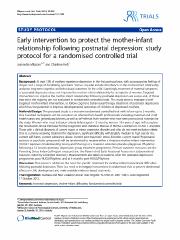Please use this identifier to cite or link to this item:
https://ahro.austin.org.au/austinjspui/handle/1/12414| Title: | Early intervention to protect the mother-infant relationship following postnatal depression: study protocol for a randomised controlled trial. | Austin Authors: | Milgrom, Jeannette ;Holt, Charlene | Affiliation: | Parent-Infant Research Institute, Austin Health, 300 Waterdale Rd, Heidelberg Heights, VIC 3081, Australia | Issue Date: | 3-Oct-2014 | Publication information: | Trials 2014; 15(): 385 | Abstract: | At least 13% of mothers experience depression in the first postnatal year, with accompanying feelings of despair and a range of debilitating symptoms. Serious sequelae include disturbances in the mother-infant relationship and poor long-term cognitive and behavioural outcomes for the child. Surprisingly, treatment of maternal symptoms of postnatal depression does not improve the mother-infant relationship for a majority of women. Targeted interventions to improve the mother-infant relationship following postnatal depression are scarce and, of those that exist, the majority are not evaluated in randomised controlled trials. This study aims to evaluate a brief targeted mother-infant intervention, to follow cognitive behavioural therapy treatment of postnatal depression, which has the potential to improve developmental outcomes of children of depressed mothers.The proposed study is a two-arm randomised controlled trial with follow-up to 6 months. One hundred participants will be recruited via referrals from health professionals including maternal and child health nurses and general practitioners, as well as self-referrals from women who have seen promotional materials for the study. Women who meet inclusion criteria (infant aged <12 months, women 18+ years of age) will complete the Structured Clinical Interview for the Diagnostic and Statistical Manual of Mental Disorders-IV-TR Axis I Disorders. Those with a clinical diagnosis of current major or minor depressive disorder and who do not meet exclusion criteria (that is, currently receiving treatment for depression, significant difficulty with English, medium to high suicide risk, current self-harm, current substance abuse, current post-traumatic stress disorder, current manic/hypomanic episode or psychotic symptoms) will be randomised to receive either a 4-session mother-infant intervention (HUGS: Happiness Understanding Giving and Sharing) or a 4-session attention placebo playgroup (Playtime) following a 12-session postnatal depression group treatment programme. Primary outcome measures are the Parenting Stress Index (self-report measure) and the Parent-child Early Relational Assessment (observational measure coded by a blinded observer). Measurements are taken at baseline, after the postnatal depression programme, post-HUGS/Playtime, and at 6 months post-HUGS/Playtime.This research addresses the need for specific treatment for mother-infant interactional difficulties following postnatal depression. There is a need to investigate interventions in randomised trials to prevent detrimental effects on child development and make available evidence-based treatments.Australia and New Zealand Clinical Trials Register: ACTRN12612001110875. Date Registered: 17 October 2012. | Gov't Doc #: | 25277158 | URI: | https://ahro.austin.org.au/austinjspui/handle/1/12414 | DOI: | 10.1186/1745-6215-15-385 | ORCID: | 0000-0002-4082-4595 | Journal: | Trials | URL: | https://pubmed.ncbi.nlm.nih.gov/25277158 | Type: | Journal Article |
| Appears in Collections: | Journal articles |
Files in This Item:
| File | Description | Size | Format | |
|---|---|---|---|---|
| 25277158.pdf | 363.84 kB | Adobe PDF |  View/Open |
Page view(s)
28
checked on Dec 20, 2024
Download(s)
102
checked on Dec 20, 2024
Google ScholarTM
Check
Items in AHRO are protected by copyright, with all rights reserved, unless otherwise indicated.
